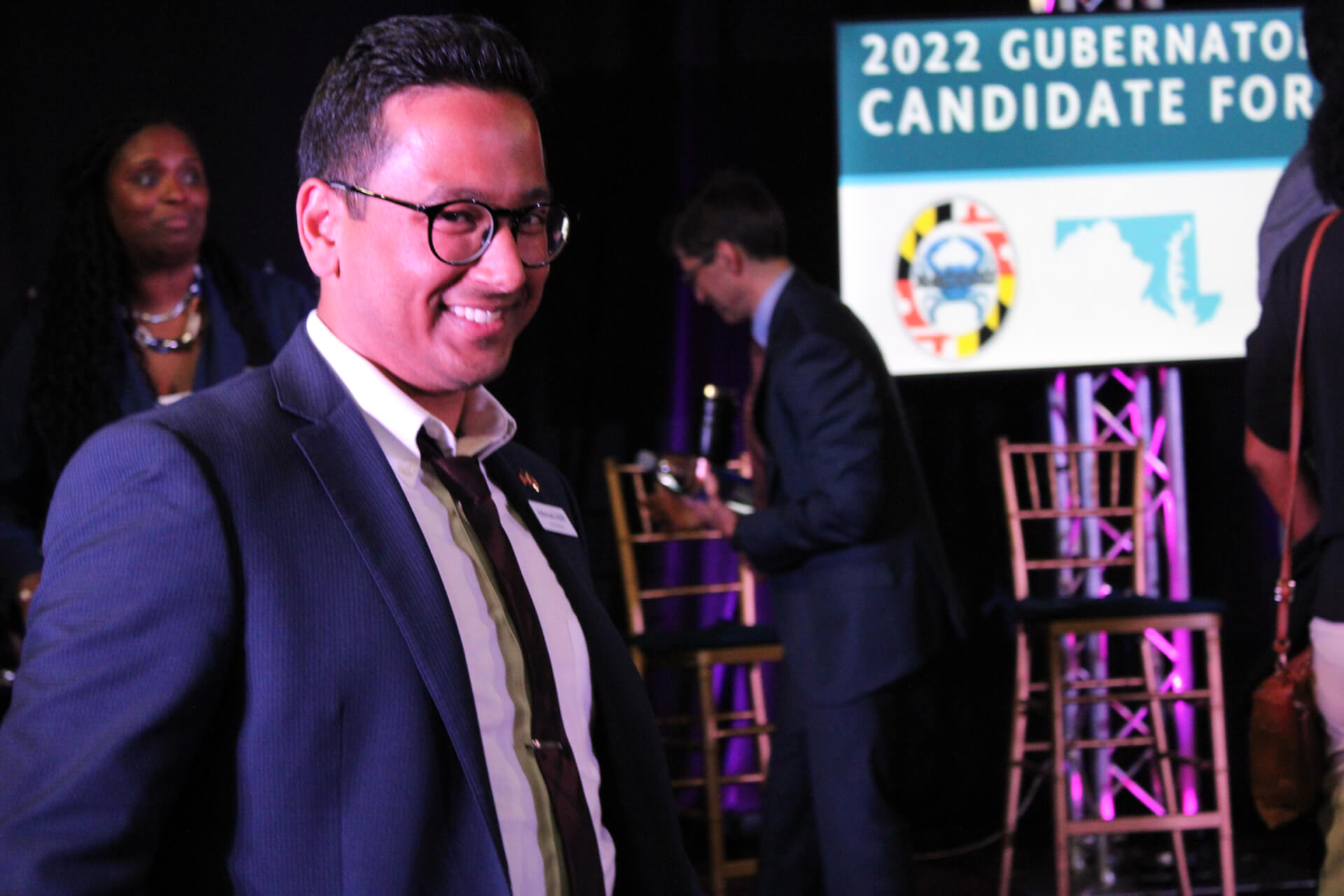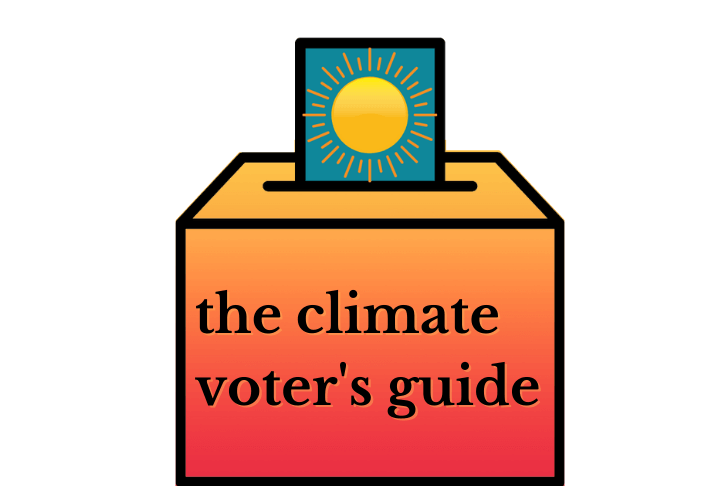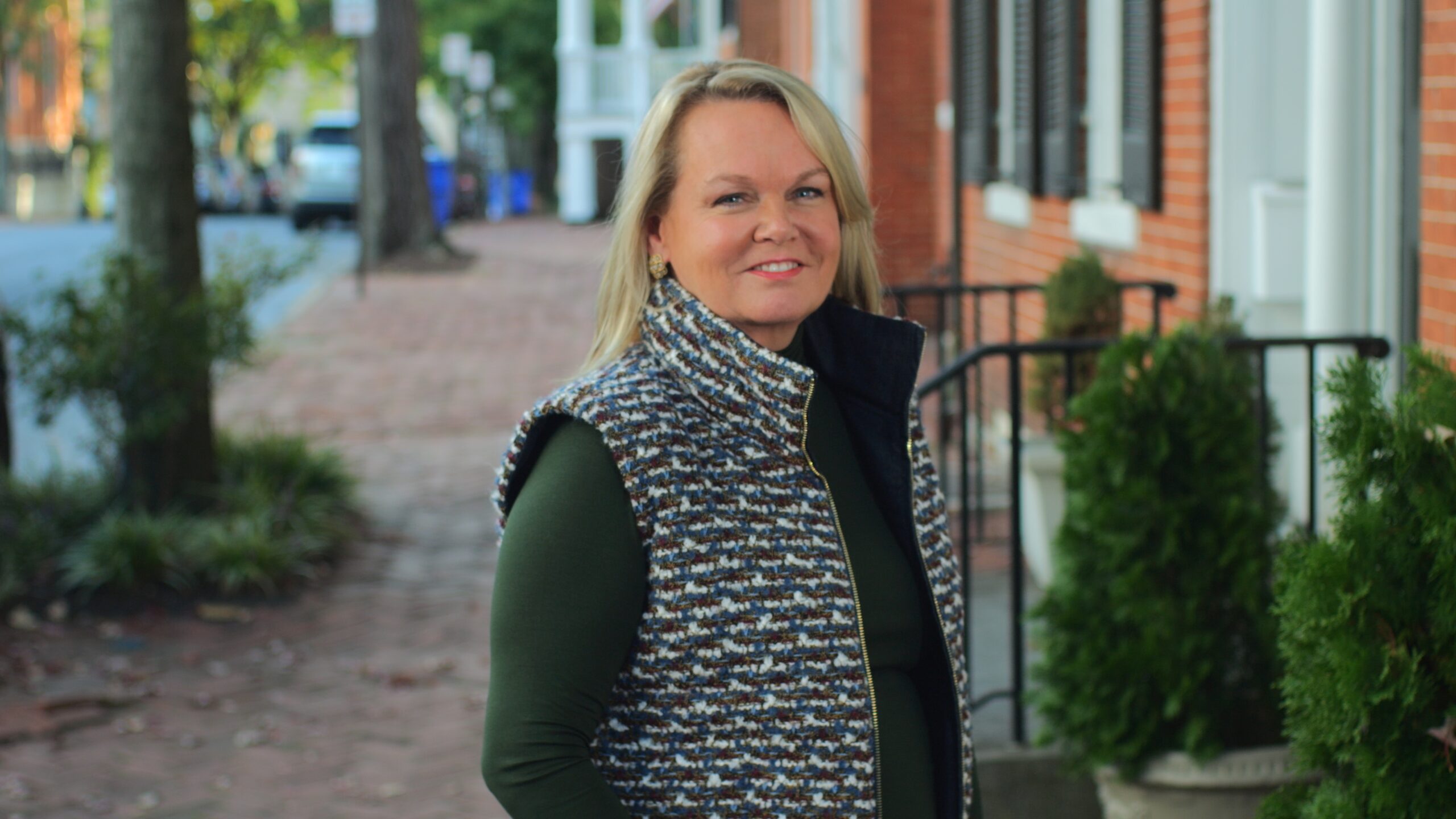Jain: Crowd-Sourcing a Solution to an Existential Crisis

Second in a series.
It’s often said that politicians campaign in poetry but govern in prose.
Ashwani Jain sees a through-line between both.
Jain, a 32-year-old former Obama administration official, is running a low-budget, unconventional campaign for the Democratic nomination for governor, staffed exclusively by volunteers. They’re helping him develop an agenda on climate change and countless other issues.
“My campaign is 100% volunteer-run and crowd-sourced,” Jain said during a recent interview. “We have folks who have been working on a host of policies, not just climate policies — middle school students, high school students, college students, activists, older retirees. It’s figuring out, as a team, what are funding resources, the data, the studies, and bringing them all together into a way that’s digestible to voters.”
He also meets with voters as he travels around the state — often one-on-one — and crafts policy prescriptions from them. Jain said that as he developed his climate policy proposals, he has particularly relied on the wisdom and experience of residents in coastal communities, especially from the Eastern Shore, where the impacts of climate change are felt most acutely.
“These are people who physically deal with the day-to-day impacts,” he said.
Jain plans to adopt the same governing strategy if he’s elected a year from now — conferring regularly with constituents, and seeking policy guidance from a combination of volunteers and professionals. As governor, he would hold official monthly “office hours” in every corner of the state.
“How we govern is dictated a lot by how we campaign,” he said. “I think the biggest complaint that residents have is that they’re not a part of the decision-making process. Look at how I’m campaigning. It’s a way of being held accountable for what you propose.”
Jain is the only millennial in the Democratic race for governor, and it shows with the energy and youthful enthusiasm he brings to the campaign trail. His political experience, before this campaign, was limited to an unsuccessful run for Montgomery County Council in 2018.
But, Jain points out, he has a multitude of life experiences, including surviving a childhood bout with cancer. And he has worked, as he says, “for the world’s biggest bureaucracy” — the federal government.
Earlier this year, Jain released a lengthy platform for combating climate change. Key elements include:
- Reforming the Public Service Commission, which regulates utilities, and the Environmental Justice and Sustainable Communities Commission, to ensure that members reflect “the diversity (and therefore lived experiences) of our state — and also to make sure that members never worked for the fossil fuels industry.
- Ensuring that every piece of legislation that touches on environmental policy contains an environmental impact study that the governor must consider before signing or vetoing.
- Increasing the frequency of poultry farm inspections.
- Investing in more stormwater filtration systems.
- Expediting the closure of coal-fired power plants.
- Requiring solar panels on the rooftops of all schools and government buildings — including the State House — on highway median strips and in brownfields areas that have been designated unsuitable for development.
- Increasing the state’s investment in hydropower.
Jain anticipates taking over from a governor, Republican Lawrence J. Hogan Jr., whom he credits for being “very politically smart” when it comes to projecting concern for the environment and adapting to climate change, but whom, he says, has few real accomplishments. The proof, Jain said, is in Hogan’s support for massive highway widening projects at the same time he pulled the plug on the Red Line transit project and in his resistance to expanding MARC train service.
“That shows me that he’s not actually serious about combating climate change,” he said.
Asked whether state government needs a “climate czar” to coordinate all the policy and budgetary efforts, Jain replied, “Yes and no.”
“Yes,” he explained, “because you have more of a centralized system, to make sure no balls are getting dropped. But it shouldn’t be just one person. It needs to be part of every conversation we have.”
In Jain’s view, every mission of state government — from transportation and infrastructure to housing, from public safety to climate resiliency — is interrelated, and state agency leaders need to break out of their silos and constantly communicate and coordinate.
Jain also sees a role for state government in local planning decisions. While the Maryland Department of Planning generally works with local governments in a technical and advisory role, Jain believes there is a benefit in a governor laying out goals for sustainable planning and development that local leaders may choose to follow. He could even envision a mechanism through which the state weighs in on county master plans.
“A governor can say, ‘Here’s what I want to accomplish,'” Jain said. “‘Here’s what the science is telling us. Here’s my plan for the next steps.'”
‘We’re already paying for the damage by these fossil fuel companies’
Jain wants to dramatically increase transit ridership in the state — by making every mode of transit controlled by the Maryland Transit Administration free to riders (multijurisdictional services like Metro, or those run by local governments, would not be covered by this policy). He estimates it would cost $150 million-$200 million annually to accomplish this.
To pay for it, Jain would seek to raise the state’s current $3.75 per pack cigarette tax by $1, tackling two public health crises at the same time, in his view (Maryland currently has the fifth highest cigarette tax in the country, according to the Campaign for Tobacco-Free Kids). But Jain isn’t sure whether he’d seek to raise the state’s 37 cents per gallon gasoline tax, which, along with the federal government, funds most transportation projects in the state.
“I don’t want to just raise taxes for the sake of raising taxes,” he said.
Jain opposes Hogan’s plan to widen Interstate 270 and the Capital Beltway — “it would be really harmful to the environment if it did go through,” he said — and sees bus rapid transit as a solution for easing traffic congestion in the state.
Jain would like to impose a state tax on carbon, starting at $15 per ton of CO2 use for non-transportation sources and $10 per ton for transportation sources, with an increase of $5 a year until the net emissions from fossil fuels are zero.
“We’re already paying for the damage by these fossil fuel companies, for the damage they’re doing,” he said. “We’re just not being paid.”
Jain said he isn’t sure whether nuclear power should be part of Maryland’s renewable fuels portfolio, saying the future of nuclear energy is best left to the federal government.
Jain said he realizes that many policy prescriptions for fighting climate change, including cleaning up the Chesapeake Bay, are unpopular in rural areas, especially on the Eastern Shore. But Jain noted that as governor, he would have “a mandate” to proceed with the policies he advocated on the campaign trail.
But he’s also mindful of the opposition and said he would work hard to listen to constituents there and try to find common ground. He notes that his parents are small business owners, so he’s sensitive to the challenges that business owners face every day. And because he plans to make himself available to constituents regularly, that accessibility can ease some of the tension.
“In my party, sometimes we tend to take an extreme talking point, even though at the end of the day the goal is agreed upon by most people,” he said. “I’m not going to insult you even if we don’t agree right away. The end goal is going to be the same.”
Jain’s personal climate hero is…
Asked to name his personal climate hero — a question Maryland Matters posed to all the Democratic contenders for governor — Jain mentions U.S. Rep. Alexandria Ocasio-Cortez (D-N.Y.), for her strategy and tactics and ability to build coalitions as well as her views, even though he concedes he does not “align with every policy she has.”
Jain and Ocasio-Cortez are the very same age.
“She’s really pushing the boundaries when it comes to the Green New Deal,” he said. “She’s really using the resources that have been provided to her. It does take some bold action to shake up the system.”
Coming Monday: An interview with Comptroller Peter V.R. Franchot. Click here for other stories in the Climate Voter’s Guide series.






 Creative Commons Attribution
Creative Commons Attribution